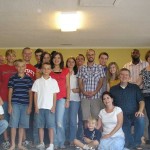Trust
Mark at “Called Out In Kansas” wrote a very good post this week called “On Faith – Volume 1” (I’m hoping that title indicates that further “volumes” are to come). In this post, Mark talks about how his understanding of faith has changed. He concludes:
So, the crux of the post is this:  faith is an important part of our Christian walk, and faith is a bi-product of our Christian walk.  We use our faith to walk in Christ, and like a muscle, the more we use it the more it grows.  As a charismatic I felt condemned if I didn’t have enough faith.  Now I understand that there are things I will stand in faith for, but haven’t walked in Christ long enough to grow into that level of faith, and so I may not see the final manifestation of what I prayed for.  This is no cause for guilt or condemnation, it just is what it is.  The longer I walk the more I will grow in faith, and the greater works He can do in and through me.
As I told Mark in a comment, I’ve started to think more and more of “faith” as trust. How much do I trust God? Do I trust God in spite of anything that may or may not happen with my life?
Blogging Statistics
I use Google Reader to track blog subscriptions. I am currently subscribed to 454 feeds, but some of them are not active.
This morning, for some reason, I decided to look at the trends for my subscriptions. Some of these trends are interesting. For example:
From your 454 subscriptions, over the last 30 days you read 2,033 items, clicked 176 items, starred 11 items, shared 0 items, and emailed 0 items.
Yes, okay, so I don’t use Google’s “share” or “email” functions. But, I only “starred” 11 items over the last 30 days. Of course, I was in Ethiopia for part of that time.
Similarly of the 2,033 items posted by the 454 blogs that I follow, most item were posted on Friday, with Monday following close behind. I was surprised by that, because Friday is usually a slow day on my blog, with fewer hits on Friday than other days of the week.
Also, more items are posted at 8:00 a.m. and 9:00 a.m. than any other time of the day. Noon sees the third most items posted, followed by 11:00 a.m. and 10:00 a.m. with items posted at other times being well below those times. (By the way, these times are all Eastern time.)
Do you think these statistics are representative of what you see blogging wise? Do the match the way that you post items to your blog?
Thinking About Blogging
I read two articles this week in which the authors write about why they blogged:
Andy at “aBowden Blog” asks “Why Blog?”
Lionel at “a view of the woods” thinks about why he blogs and traces his blogging history in “Blogging: The Joys and Sorrows.”
Do you blog? If so, why? If not, why not?
But will you “Stop”?
Three years ago, I wrote a post called “But will you ‘Stop’?” The point of the post is simple: we can study, and explain, and discuss, and argue, and teach, and preach, and examine, and analyze, etc. But if we do not obey, then all of the above is moot.
——————————————–
John at “Jesus the Radical Pastor” shares a post called “The Meaning of ‘Stop’” which was originally written by Tim Perry from Durham University. He uses caricatures of modern hermeneutical methods to examine the meaning of the word “STOP” on a stop sign. Here are some of my favorites (although there are many hilarious examples):
5. A fundamentalist, taking the text very literally, stops at the stop sign and waits for it to tell him to go.
6. A seminary-educated evangelical preacher might look up “STOP” in his lexicons of English and discover that it can mean: 1) something which prevents motion, such as a plug for a drain, or a block of wood that prevents a door from closing; 2) location where a train or bus lets off passengers. The main point of his sermon the following Sunday on this text is: when you see a stop sign, it is a place where traffic is naturally clogged, so it is a good place to let off passengers from your car.
10. A NT scholar notices that there is no stop sign on Mark street but there is one on Matthew and Luke streets, and concludes that the ones on Luke and Matthew streets are both copied from a sign on a street no one has ever seen called “Q” Street. There is an excellent 300 page doctoral dissertation on the origin of these stop signs and the differences between stop signs on Matthew and Luke street in the scholar’s commentary on the passage. There is an unfortunate omission in the dissertation, however; it doesn’t explain the meaning of the text!
Yes, these are funny and very close to reality. But, I wonder: how many people who study the stop sign would actually stop?
I enjoy a good scholarly study of a biblical passage. But, if you want to teach, start by living out what you are teaching. You can study and outline and explain and exhort, but if your life does not match what you say, then you are not teaching (in the NT pattern of teaching). Consider this passage from Jesus:
The scribes and the Pharisees sit on Moses’ seat, so practice and observe whatever they tell you- but not what they do. For they preach, but do not practice. (Matthew 23:2-3 ESV)
And this passage from Jesus:
Jesus answered him, “If anyone loves me, he will keep my word, and my Father will love him, and we will come to him and make our home with him. Whoever does not love me does not keep my words. And the word that you hear is not mine but the Father’s who sent me. (John 14:23-24 ESV)
And this passage from Paul:
What you have learned and received and heard and seen in me- practice these things, and the God of peace will be with you. (Philippians 4:9 ESV)
And this passage from James:
Who is wise and understanding among you? By his good conduct let him show his works in the meekness of wisdom. (James 3:13 ESV)
So, study the stop sign. Examine the stop sign. Analyze the stop sign. Read what others say about the stop sign. Discuss the stop sign. But, most of all, STOP!
The Sheep or Shepherding?
Rod left a comment on my post “Rejected” that I want to give more visibility.
His comment was an excerpt from a Christianity Today article called “To Serve Is to Suffer.” Here is part of the article:
The biblical model of community life is Jesus’ command to love one another as he loved us—that is, for members to die for other members (John 15:12-13). The model of Christian leadership is that of the Good Shepherd dying for his sheep, not abandoning them when the situation gets dangerous (John 10:11-15). When God calls us to serve him, he calls us to come and die for the people we serve. We don’t discard people when they have problems and cannot do their job properly. We serve them and help them come out of their problems. We don’t tell people to find another place of service when they rebel against us. We labor with them until we either come to agreement or agree to disagree.
When people leave a church because they do not fit the program, it communicates a deadly message: that our commitment is to the work and not to the person, that our unity is primarily in the work and not in Christ and the gospel. The sad result is that Christians do not have the security of a community that will stay by them no matter what happens. They become shallow individuals, never having true fellowship and moving from group to group. Churches committed to programs can grow numerically, but they don’t nurture biblical Christians who understand the implications of belonging to the body of Christ.
The way we treat people who disagree with us demonstrates whether we love the people or the work… (By the way, I think this is true for all believers, not just elders/pastors/leaders.)
Rejected
Do you know what happens when you question someone’s traditions or you question the status quo? Eric from “A Pilgrim’s Progress” knows, and he writes about it in his post “If you Challenge the Status Quo…”
Speaking of church traditions, Eric says:
If you open your bibles and then look at your church, you will most likely see some inconsistencies. In some churches there are few; in others there are almost too many to count. When you point these things out, the following ten things will happen from at least some people:
-You will not be welcomed.
-You will be scorned.
-You will be talked about behind your back.
-You will be ignored.
-It will be labeled divisive.
-You won’t be trusted anymore.
-You will face rejection.
-You will be told that you just don’t understand.
-You will be told to trust those in authority.
-You will be told that it was that way then, but it is this way now.
Yep. Eric’s right. I’ve seen all of those reactions.
Although, I have noticed that people will be more likely to listen to you if they actually know you (you share your life with them and vice versa) and if your life is a good example of godliness.
What do you think? Have you faced any of these reactions? Have you reacted this way before?
Churches, Events, and Maturity
Steve from “Gospel-Centered Living” has published another excellent article called “Confusing Participation with Transformation.” He says that it’s easy for churches to spend huge amounts of time, money, and energy promoting and carrying out big events, and then to confuse participation at these events with authentic Christian living. (I think this sometimes happens weekly, unfortunately.)
He says:
We should ask, “What is our mission, again?â€Â Is it to make church members or make disciples? Can I measure my spiritual formation with my calendar? Can my church measure its success with attendance rolls?
Those are good questions. What do you say? How should the church “measure its success?”
Blogging for Books
Waterbrook Multnomah Publishing Group is revamping its “Blogging for Books” program. They expect to relaunch the program sometime in October.
I don’t know exactly what the new program will look like. But, according to the site:
The new & improved program will be easier to use, more advanced and feature several fun “surprises 
So, I signed up. If you’re interested, jump over to the site and sign up also.
Sincere love makes the greatest difference
My friend Danny (from “learning…“) met with us for just over a year. Then, a couple of weeks ago, he moved to Williamsburg, VA. In his post, “A Wonderful Body of Believers,” he talks about the time that he spent with us. I can’t think of a better compliment that what Danny says:
During my time at SEBTS there have been many who have befriended me over the years and blessed me in some way. As an encouragement to you I would like to share about some of them and what they did for me . These people did things that are not in some method book for discipleship, community, fellowship, or teaching. They were just simply being themselves in the Lord and reached out to me for the bottom of their heart through the gifts the Holy Spirit has given them and used the World’s Goods that God gave them. It is this sincere love for God and people that makes the greatest difference. It is when they were like Christ to me that they ministered the most to me.
Here is a picture of many of the people who gather as Messiah Baptist Church. They have reached out to me as a brother and a son, taken me into their homes, fed me, encouraged me, fixed my car, helped me move, talked about (walked with) Jesus and the Bible, talked philosophy, showed me how to love others, even let me use my gifts in the Lord to encourage, teach and comfort them, and much much more. With out neglecting structure at the proper times all this was mostly spontaneous.
I would like to say more but our (and “Messiah Baptist’sâ€) real boast is in the Lord, Jesus Christ. It is he that began a good work in us and will complete it. It is he that is working though us to love, to teach, to understand, to spread the good news and build the Kingdom of God: His kingdom.
I pray that we will treat everyone that God brings into our lives that way that Danny felt we treated him… to God’s glory and for the advancement of his Kingdom! I can also tell you that Danny was a huge encouragement to all of us!
By the way, Danny includes a picture of some of the people that we meet with in his blog post.
Neighborly
Even when they disagree about the causes and reasons, many Christians agree that there is a lack of real community in most churches… even good churches. I think that stories and examples can help people understand what it means to live in community with others.
Dan (at “The Ekklesia in Southern Maine“) has written two posts dealing with “Neighbors in Limington”: “The Ice Storm” and “Cancer.” Both stories give a glimpse into community (neighborhood) life.
The church should demonstrate at least this much community… and more.
Thanks for stories and examples, Dan! Keep ’em comin’. (That’s southern for “write some more stuff.”)










